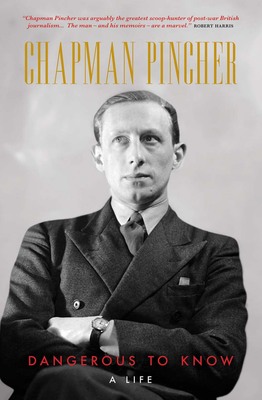
Investigative journalist, Chapman Pincher, has spent a lifetime exposing official secrets. During a stint in the army in the Second World War, Pincher developed an interest in weapons and how they worked – an interest which opened the door to an unexpected and exciting career. Although he retired from Fleet Street in 1979, he continues to investigate and collect evidence to this day.
In his autobiography published this week, Chapman Pincher : Dangerous To Know, he reveals how he built up some of his biggest cases, how he made and used his connections for information and how, with what he calls “far more than a fair share of lucky breaks”, he got worldwide scoops time and time again.
Here’s a sneak peek from Chapter Three – Rocket Man:
When, in August 1945, news of the destruction of Hiroshima by one atomic bomb astonished the world, [Express editor] Christiansen was told by Lord Beaverbrook that the event was so historic that he must keep the story going on the front page for a fortnight. (Foreseeing the vast political implications, Beaverbrook himself had dictated the front-page headline: ‘The Bomb that Has Changed the World’.)
Bound by a secrecy deal with the US, the government issued no newsworthy information. So the editor turned to me in some desperation. I knew that Professor Marcus Oliphant, of Birmingham University, had been involved in the British atomic effort so I telephoned him. Oliphant told me that the US government had released a thick report describing the whole project and that the UK atomic HQ in London had an advance copy. With the agreement of my colonel, who was fascinated to know what was in it, I went there in civilian clothes, gave Oliphant’s name and was allowed to see the now historic Smyth Report, as it was called, and make notes. The colonel gave me a week’s leave, provided that I reported my findings to him each evening, and I went daily to take notes and then write my story which, of course, did not mention the report.
The result was a succession of world scoops because there had been a hold-up on the release of the Smyth Report in Washington! The editor was so impressed and relieved that he offered me the post of defence and scientific reporter on my release from the army, meanwhile expecting me to continue with my clandestine contributions. The salary he offered was many times greater than anything I had earned before and was not restricted by fixed annual increments but would be entirely performance-based. I accepted immediately with delight, having entered the one profession in which I could utilise all my acquired knowledge.
Chapman Pincher : Dangerous To Know by Harry Chapman Pincher is out now. Get the book here
